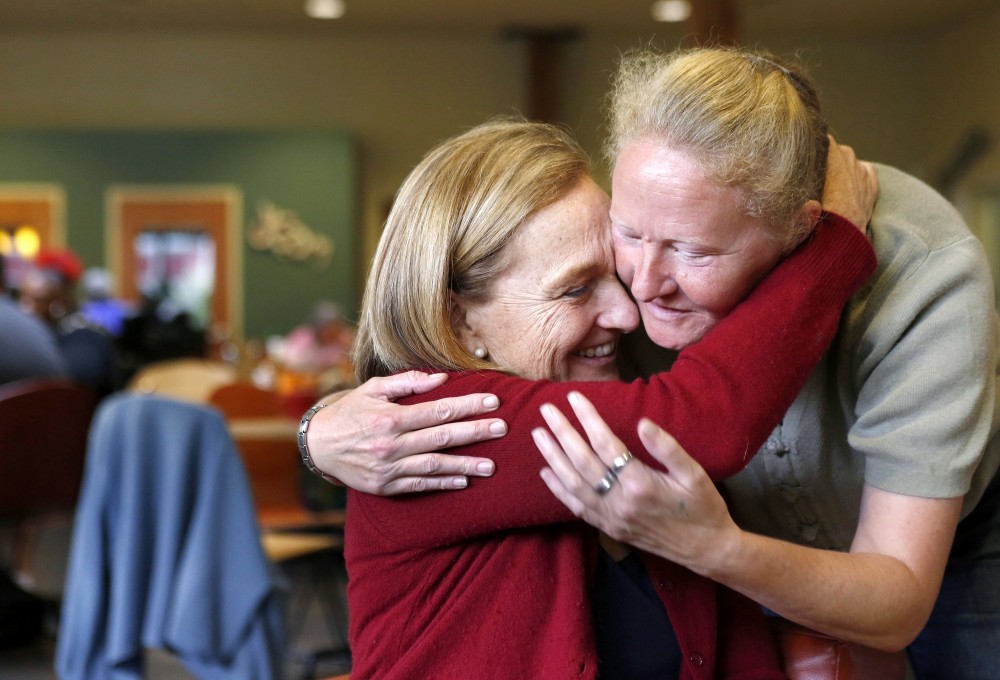By Nicole Brodeur
The Seattle Times.
SEATTLE
It may be wedged into a busy intersection in downtown Seattle, but the Recovery Cafe remains a mystery to most.
Recovery from what? And can you eat there? Is it a restaurant?
Everything. Yes. And, well, sort of.
The Recovery Cafe is a community, built from the heart of a woman named Killian Noe.
For 10 years, Noe, 56, has been the center of this place, which serves those battling drug and alcohol addiction. She greets, she listens, she hugs, she shares, she remembers every name. And she believes in people who have all but stopped believing in themselves.
“You walk in the door and you’re broken,” she explained to me recently. “You’ve been told that you’re not worth loving or knowing. But everyone longs to be known and loved and part of a community. Your life matters.”
On Sept. 24, the Recovery Cafe will mark its 10th anniversary at its annual Standing in the Gap Breakfast, where Noe is unofficial star, the one people are eager to connect with, be it a confessional chat or a wave from across the room.
Noe’s specialty is standing on the dais and explaining the cafe’s community to those who have never set foot inside.
“I always feel exposed, but in a good way,” she said of her speeches. “I look out and I see people hungry for a deep connection.
“When we claim our connection with those who are suffering and being left out, then we will want to work for justice on their behalf. But it’s really on our behalf as well, because in reality we belong to each other.”
Noe learned about community at an early age. Her father was a preacher in North Carolina, where everyone knew her and she knew everyone.
“Community has always been central for me,” she said. “I’ve always had a passion for learning from different communities and nurturing community. It’s one of the deepest things in me.”
At 21, she went to the Middle East to do volunteer work with teenagers there. When she returned to the U.S. three years later, she was stunned at the number of homeless people on the streets.
Her mentor, the late social-justice pastor Gordon Cosby, who founded Church of Our Saviour in Washington D.C., told her that instead of tourists seeing homeless when they visit a city, they should see a rebuilt community “Where those who have fallen through the cracks can rebuild their lives.”
As Noe recalled this, she looked out of her window at the people in the cafe’s main room. Some ate lunch in animated groups, others sat alone with a cup of coffee.
“What I see in every person who walks through this door is someone who has suffered with not just one trauma, but one after another and another,” she said. “There’s so many layers of hurt and pain that for us, it’s like triage.”
Noe has spent most of her life honing practical and pastoral skills and searching for just the right formula to heal hearts and lives.
She has visited monastic communities, Trappist and Benedictine, to learn how to be silent. She spent time in South Africa during the last year of apartheid to learn about racial reconciliation.
In 1985, she started the Samaritan Inns, a 28-day residential treatment program with five transitional homes in Washington, D.C.
In 1999, she moved to Seattle with her husband, Bernie Noe, who had accepted a job as the head of The Lakeside School.
She visited with nonprofits, and learned that 50 to 70 percent of the people in Seattle’s shelters were addicted or mentally ill.
In 2004, she launched the Recovery Cafe to offer those people the recovery support that some housing programs can’t. (It moved to a new location in 2009).
“They can’t look you in the eye when they come in the door because the pain is so heavy,” she said “But when they plant themselves in the soil of an authentic community, we literally see them come back to life.
buy viagra sublingual online www.adentalcare.com/wp-content/themes/medicare/editor-buttons/images/en/viagra-sublingual.html no prescription
”
Anyone can come to the Recovery Cafe for one day, as long as they are clean and sober. If they want to return, they have to attend an orientation, where the rules of the place are made clear:
You must attend a weekly recovery, or “loving accountability circle,” as Noe prefers to call it; and contribute to the running of the place, be it cleaning or cooking, and aid in the healing of others.
“Everyone has to work,” Noe said. “The services are given freely, but one of the requirements is to operate the facility.”
Members may also take classes in meditation, yoga, dance, as well as resume writing and conflict resolution. (“From the practical to the sublime,” Noe said).
Once they stabilize in their recovery and sobriety, the Recovery Cafe helps them find housing.
She and her husband have been married for 32 years and have two grown daughters, Kietrie, 25 and Phoebe, 23. The girls live together in New York City, where Kietrie works in the fashion industry and Phoebe works for a nonprofit that helps victims of sex trafficking and domestic violence.
“Everybody’s good,” Noe said with a quiet smile.
Every year for the past 15 years, the family has traveled to Nicaragua, where they have “nurtured” a school in a slum outside of Managua.
At home, Noe refuels by walking her dogs. (“I find just being with them and walking them is restful,” she said).
She is working on a book about the cafe: “Whatever we’ve learned about the commitments and ingredients that guide this community, I’d like to put in writing, in case they can be helpful to others.”
But it will not be her story alone. It belongs to everyone who ever wondered enough about this place to become part of it.
“There is a magic here,” Noe said, “that is greater than what any one individual brings.”
___














































































































































































































































































































































































